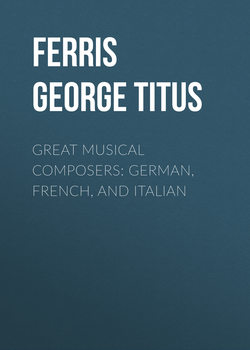Читать книгу Great Musical Composers: German, French, and Italian - Ferris George Titus - Страница 17
HAYDN
III
ОглавлениеDuring the thirty years of Haydn’s quiet life with the Esterhazys he had been gradually acquiring an immense reputation in France, England and Spain, of which he himself was unconscious. His great symphonies had stamped him world-wide as a composer of remarkable creative genius. Haydn’s modesty prevented him from recognising his own celebrity. Therefore, we can fancy his astonishment when, shortly after the death of Prince Nicholas Esterhazy, a stranger called on him and said, “I am Salomon, from London, and must strike a bargain with you for that city immediately.”
Haydn was dazed with the suddenness of the proposition, but the old ties were broken up, and his grief needed recreation and change. Still, he had many beloved friends, whose society it was hard to leave. Chief among these was Mozart. “Oh, papa,” said Mozart, “you have had no training for the wide world, and you speak so few languages.” “Oh, my language is understood all over the world,” said Papa Haydn, with a smile. When he departed for England, December 15, 1790, Mozart could with difficulty tear himself away, and said, with pathetic tears, “We shall doubtless now take our last farewell.”
Haydn and Mozart were perfectly in accord, and each thought and did well towards the other. Mozart, we know, was born when Haydn had just reached manhood, so that when Mozart became old enough to study composition the earlier works of Haydn’s chamber music had been written; and these undoubtedly formed the studies of the boy Mozart, and greatly influenced his style; so that Haydn was the model, and, in a sense, the instructor of Mozart. Strange is it then to find, in after-years, the master borrowing (perhaps with interest!) from the pupil. Such, however, was the fact, as every amateur knows. At this we can hardly wonder, for Haydn possessed unbounded admiration not only for Mozart, but also for his music, which the following shows. Being asked by a friend at Prague to send him an opera, he replied: —
“With all my heart, if you desire to have it for yourself alone, but if you wish to perform it in public, I must be excused; for, being written specially for my company at the Esterhazy Palace, it would not produce the proper effect elsewhere. I would do a new score for your theatre, but what a hazardous step it would be to stand in comparison with Mozart! Oh, Mozart! If I could instil into the soul of every lover of music the admiration I have for his matchless works, all countries would seek to be possessed of so great a treasure. Let Prague keep him, ah! and well reward him, for without that the history of geniuses is bad; alas! we see so many noble minds crushed beneath adversity. Mozart is incomparable, and I am annoyed that he is unable to obtain any court appointment. Forgive me if I get excited when speaking of him, I am so fond of him.”
Mozart’s admiration for Haydn’s music, too, was very marked. He and Herr Kozeluch were one day listening to a composition of Haydn’s which contained some bold modulations. Kozeluch thought them strange, and asked Mozart whether he would have written them. “I think not,” smartly replied Mozart, “and for this reason: because they would not have occurred either to you or me!”
On another occasion we find Mozart taking to task a Viennese professor of some celebrity, who used to experience great delight in turning to Haydn’s compositions to find therein any evidence of the master’s want of sound theoretical training – a quest in which the pedant occasionally succeeded. One day he came to Mozart with a great crime to unfold. Mozart as usual endeavoured to turn the conversation, but the learned professor still went chattering on, till at last Mozart shut his mouth with the following pill – “Sir, if you and I were both melted down together, we should not furnish materials for one Haydn.”
It was one of the most beautiful friendships in the history of art, full of tender offices, and utterly free from the least taint of envy or selfishness.
